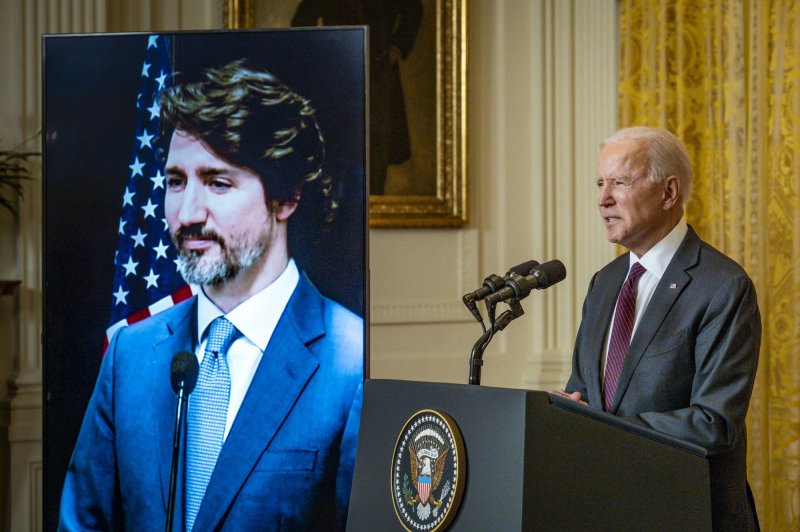1 of 4 | President Joe Biden held his first bilateral meeting with Canadian Prime Minister Justin Trudeau as they reaffirmed their commitment to work together to combat COVID-19 and climate change. Pool Photo by Pete Marovich/UPI |
License Photo
Feb. 23 (UPI) -- U.S. President Joe Biden and Canadian Prime Minister Justin Trudeau reaffirmed their commitment to working together as close allies, particularly to combat the COVID-19 pandemic and climate change during a virtual bilateral meeting on Tuesday.
Speaking via video conference at the White House, Biden delivered a warm greeting to Trudeau, who called in from Ottawa, declaring that the United States has "no closer friend than Canada."
"That's why you were my first call as president, my first bilateral meeting ... and so our channel of communication is wide open," Biden said.
The discussion follows a chilled relationship between the two nations under the Trump administration and Biden's recent move to cancel the Keystone XL pipeline and Canada's difficulty in obtaining coronavirus vaccines from plants near the U.S.-Canada border.
Prior to the meeting, the White House released a roadmap for the partnership between the United States and Canada focusing on "the recovery from COVID-19 and global health security, efforts to combat climate change and shared priorities in defense and security."
Biden said that getting COVID-19 under control was an "immediate priority" for both nations as they committed to strengthening the World Health Organization and cooperating to strengthen the supply chain to ensure economic recovery.
"We're facing tough times, there's no doubt, but we're not facing them alone. Canada and the United States are each other's closest allies, most important trading partners and oldest friends. And we stand united to beat this pandemic and build a better tomorrow," said Trudeau.
On climate change, Biden and Trudeau will launch a high-level climate ministerial the White House says will align policy and goals in view of the United States' return to the Paris Climate Agreement under the new U.S. administration.
"They will commit to strengthened implementation of the Paris Agreement by working jointly and with others to increase the scale and speed of action toward the goal of net-zero emissions by 2050," the White House said.
Trudeau applauded Biden's decision to return the United States to the Paris Climate Agreement, alluding to past instances when the Trump administration refused to sign on to statements addressing the impact of climate change.
"U.S. leadership has been sorely missed over the past -- past years. And I have to say as we're preparing the joint rollout and communique from this one, it's nice when the Americans are not pulling out all references to climate change and, instead, adding them," he said.
The two leaders also agreed to focus on addressing global challenges through international institutions such as the United Nations, G7, G20, World Trade Organization, North Atlantic Treaty Organization and Five Eyes intelligence alliance as well as committing to further trilateral meetings with Mexico.
Biden reiterated U.S. support for the release of Michael Spavor and Michael Kovrig, two Canadians who have been detained in China since 2018 on espionage charges. Their detention is widely seen as politically motivated for China to use them as leverage to secure the release of Meng Wanzou, a Huawei executive arrested by Canadian authorities in December 2018 at the behest of the United States.
"Human beings are not bartering chips. You know, we're going to work together until we get their safe return," Biden said.















